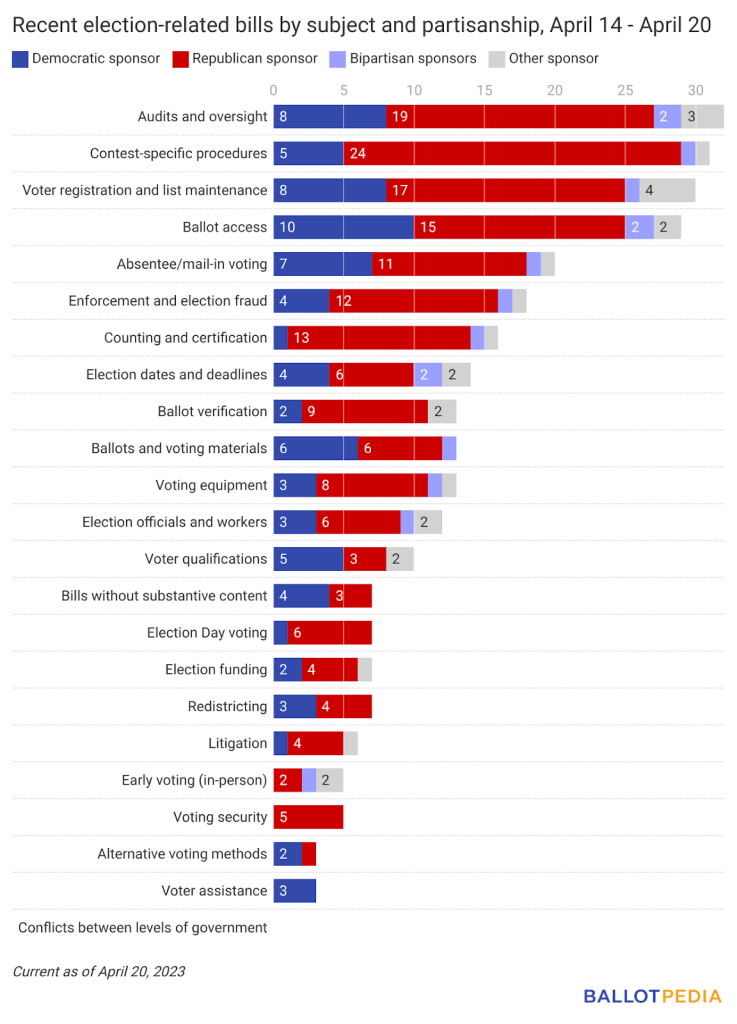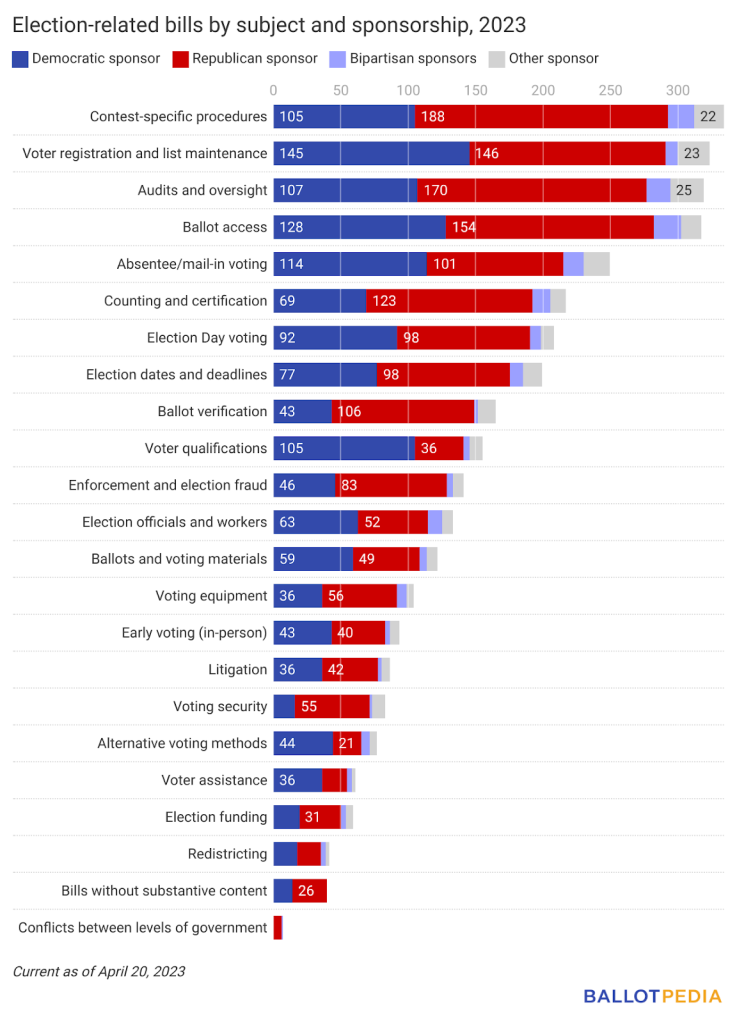Welcome to The Ballot Bulletin: Ballotpedia’s Weekly Digest on Election Administration. Every Friday, we deliver the latest updates on election policy around the country, including legislative activity, nationwide trends, and recent news.
In today’s issue, you’ll find:
- Legislative activity: About the bills acted on this week and a big-picture look at all the bills we have tracked this year.
- Recent news: Noteworthy developments in election policy at the federal, state, and local levels, including litigation and ballot measures.
Legislative activity
State legislatures acted on 182 election-related bills from April 14 to April 20, up from 134 bills the previous week. Of these, 65 either passed one chamber, passed both chambers, were enacted, or were defeated.
Highlights:
- These 182 bills represent 7.6% of the 2,406 election-related bills introduced in 2023. At this point in 2022, 108 bills had been acted on in some way in the past week, and we were tracking 2,505 election-related bills, 4.1% more than this year.
- Of the 65 bills moving past the introductory stage, 13 (20%) are in Democratic trifecta states, 43 (66.2%) are in Republican trifecta states, and nine (13.8%) are in states with divided governments.
- The bill topics with the most legislative activity this week were audits and oversight (32), contest-specific procedures (31), voter registration and list maintenance (30), ballot access (29), and absentee/mail-in voting (20).
Recent activity and status changes
Of all election-related bills in state legislatures in 2023:
- 81 have been enacted (+4 from last week)
- 46 passed both chambers (+4)
- 166 passed one chamber (+15)
- 2 advanced from committee (No change)
- 2,040 have been introduced (-18)
- 64 are dead (+13)

Enacted bills
States have enacted 81 election-related bills in 2023, 55.5% of the 146 bills states had enacted at this point in 2022. Of these 81 bills, Democrats sponsored 13 (16%), Republicans sponsored 47 (58%), a combination of Democrats and Republicans sponsored 14 (17.3%). Partisan sponsorship was not available for the remaining bills. To see all bills approved this year, click here.

Bills enacted since April 14, with their official titles, are below.
Tennessee (Republican trifecta)
- TN HB1549: AN ACT to amend Chapter 563 of the Acts of 1903; as amended by Chapter 64 of the Acts of 1907; Chapter 647 of the Private Acts of 1911; Chapter 158 of the Private Acts of 1915; Chapter 170 of the Private Acts of 1915; Chapter 3 of the Private Acts of 1917; Chapter 397 of the Private Acts of 1919; Chapter 23 of the Private Acts of 1919; Chapter 231 of the Private Acts of 1919; Chapter 764 of the Private Acts of 1927; Chapter 232 of the Private Acts of 1941; Chapter 669 of the Private Acts of 1947
Bills that passed both chambers
Forty-six bills have passed both chambers (but have not yet been enacted) in 2023. These bills represent 139.4% of the 33 bills that had passed both chambers at this point in 2022. To see all bills that have currently passed both chambers, click here.
Active bills that passed both chambers since April 14, with their official titles, are below.
Indiana (Republican trifecta)
- IN SB0177: School board candidate filing deadline.
Montana (Republican trifecta)
- MT SB61: Clarify definition of election officials
- MT SB254: Generally revise election laws
- MT SB117: Prohibiting use of certain funds for conducting an election
- MT SB143: Allow for a referendum to terminate citizen initiated zoning district
- MT HB543: Revise laws for ballot wording for bonds and levies
- MT HB335: Generally revise election laws related to absentee ballot list procedures
- MT SB197: Revise and extend post-election audit process
Tennessee (Republican trifecta)
- TN HB1039: AN ACT to amend Tennessee Code Annotated, Section 2-3-102, relative to reviewing assignments of voters to precincts and districts.
Washington (Democratic trifecta)
- WA HB1049: Updating timelines for adopting county commissioner district boundaries following expansion from three to five commissioners.
- WA SB5082: Encouraging electoral participation and making ballots more meaningful by abolishing advisory votes.
Defeated bills
Sixty-four bills have been defeated in 2023. These bills represent 36.4% of the 176 bills that were defeated at this point in 2022. To see all bills that have been defeated in 2023, click here.
Bills defeated since April 14, with their official titles, are below.
Nevada (Divided government)
- NV SB75: Requires the election of a registrar of voters. (BDR 24-513)
- NV SB53: Revises provisions relating to elections. (BDR 24-411)
- NV AB88: Requires proof of identity to vote in an election. (BDR 24-33)
- NV AB59: Revises provisions concerning the confidentiality of certain personal information of certain persons. (BDR 20-408)
- NV SJR1: Proposes to amend the Nevada Constitution to revise provisions relating to elections involving incumbent justices or judges who are unopposed. (BDR C-515)
- NV AB307: Revises provisions relating to elections. (BDR 24-664)
- NV SB230: Requires certain proof of identity to vote in an election. (BDR 24-175)
- NV SB135: Revises the deadline for returning mail ballots by mail. (BDR 24-529)
- NV AB370: Revises provisions governing elections. (BDR 24-202)
- NV AB230: Revises the deadline for returning mail ballots by mail. (BDR 24-736)
- NV AB326: Revises provisions relating to elections. (BDR 24-690)
- NV SB325: Revises provisions relating to elections. (BDR 24-105)
- NV SB157: Revises provisions relating to elections. (BDR 24-173)
Recent activity by topic and sponsorship
The chart below shows the topics of the bills state legislatures acted on since April 14. Click here to see a full list of bill categories and their definitions.

* Note: Contest-specific procedures refers to primary systems, municipal election procedures, recall elections, special election procedures, and other systems unique to a particular election type.
All 2023 bills by topic and sponsorship
The chart below shows the topics of a sample of the 2,406 bills we have tracked this year. Note that the sums of the numbers listed do not equal the total number of bills because some bills deal with multiple topics.

Enacted bills by topic and sponsorship, 2022 vs. 2023

Recent activity by state and trifecta status
Sixty-two (34.1%) of the 182 bills with activity this week are in Democratic trifecta states, 106 (58.2%) are in Republican trifecta states, and 14 (7.7%) are in states with divided governments.
Of the 108 bills seeing activity during this week in 2022, 36 (33.3%) were from states with Democratic trifectas, 42 (38.9%) were from states with Republican trifectas, and 30 (27.8%) were from states with divided governments.
The map below shows election-related bills acted on in the past week by state trifecta status.

All 2023 bills by state and trifecta status
Of the total bills introduced in 2023, 1,030 (42.8%) are in states with Democratic trifectas, 1,119 (46.5%) are in states with Republican trifectas, and 257 (12.7%) are in states with divided governments.
Texas legislators have introduced the most election-related bills this year. Texas holds legislative sessions in odd years only, and so had no activity in 2022. New York was the most active state at this point in 2022. South Dakota has enacted the most bills this year. In 2022, New York and California had enacted the most bills at this point.
The map below shows the number of election-related bills introduced by state in 2023 by state trifecta status.

Recent news
Idaho officials say new law eliminates presidential primary
Idaho Gov. Brad Little (R) signed H0138 into law on March 30. This bill moves the presidential primary date to the general primary date on the third Thursday in May. However, the legislature did not pass a related bill making necessary technical changes, SB1186. Secretary of State Phil McGrane (R) said, “There were technical issues with [H0138] in terms of the mechanics on how a candidate would file to run for president, so in effect it definitely eliminated the March presidential preference primary but didn’t have all of the necessary pieces for the primary to occur in the May election.” McGrane added, “A lot of it now is in the hands of the political parties. They are now in the driver’s seat, not the state.” House Assistant Minority Leader Lauren Necochea (D) called for a special session and said, “Idaho Democrats supported the consolidation of Idaho’s presidential primary and other primary elections to save public dollars while allowing voter participation. Unfortunately, far-right politicians blocked a needed technical correction to the bill, taking away Idahoans’ right to vote for their preferred presidential nominee.” Under Idaho law, the legislature may call itself into session with the approval of 60% of its members, and the governor may also call a special session and set its agenda.
Pennsylvania Supreme Court issues sanctions in voting machine case
The Pennsylvania Supreme Court issued sanctions against officials in Fulton County on April 19 for sharing voting machine data from the 2020 general election. After the county gave a third-party company, Wake TSI, access to its voting machines shortly after the election, the Pennsylvania Department of State decertified the machines and the state supreme court blocked the county from allowing any further access to them. Fulton County commissioners Stuart Ulsh and Randy Bunch allegedly allowed another third party, Speckin Forensics LLC of Lansing, Michigan, to copy data from hard drives from the voting machines in July of 2022. Writing for the court, Justice David Wecht (D) said, “We find that Fulton County and its various attorneys have engaged in a sustained, deliberate pattern of dilatory, obdurate and vexatious conduct and have acted in bad faith throughout these sanction proceedings.” In an interview with The Associated Press, Ulsh said he had not read the court’s opinion, but said, “Nothing happened in Fulton County. I know that because of what I did.” The court’s ruling requires a neutral agent to hold the machines, which the county rented from Dominion Voting Systems Inc., at county expense. The court also ruled Dominion is entitled to legal costs associated with the case, which Commonwealth Court President Judge Renee Cohn Jubelirer (R) will determine.
Learn More






